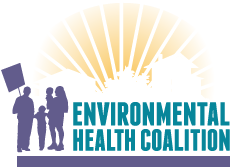- Quienes Somos
- Nuestro Trabajo
- En Donde Trabajamos
- Media Center
- Giving
- Contacto
Las comunidades de color y escasos recursos deben ser líderes en lo que respecta a soluciones ante el cambio climático, ya que, si bien es cierto que éste nos afecta a todos, las comunidades de escasos recursos son las que sufren los primeros y peores impactos.
Científicos climáticos locales pronostican cambios importantes en la región de San Diego, entre ellos calores extremos, sequía, escasez de agua, incendios naturales, contaminación atmosférica y elevación del nivel del mar. Los efectos del cambio climático se magnifican en barrios de escasos recursos como Barrio Logan, City Heights y National City debido a que es en estas comunidades en las que se encuentran ubicadas las principales fuentes de contaminación. Sus habitantes asimismo enfrentan industrias contaminantes, infraestructura inadecuada, limitadas alternativas de transporte y pocas oportunidades económicas.
En 2015, el Ayuntamiento de San Diego adoptó un Plan de Acción Climática cuyo fin es reducir la contaminación en dicha ciudad durante los próximos 50 años. EHC trabajó arduamente en vigilar que este plan priorizara la equidad social.
EHC vigila que nuestras comunidades participen plenamente en desarrollo de políticas y en abogacía para reducir la contaminación atmosférica, mejorar las alternativas de transporte y lograr que se beneficien de la transición hacia prácticas energéticas limpias y eficientes. Nuestra labor para fomentar dichos cambios se realiza en apego a nuestros principios rectores.
No hay artículos en esta categoría. Si se muestran las subcategorías en esta página, puede que tengan artículos.
Subcategorías
Green Energy
Renters need clean energy too. In San Diego, non EJ communities have more than double the residential solar (40 per 1000 residents) compared to EJ communities (18 per 1000 residents).55 We attribute this discrepancy to a variety of barriers making solar installation difficult to access and afford for all people.
San Diego is a “solar star,” but not for environmental justice communities. According to a 2018 report by Environment California, San Diego has the second most solar power capacity among the 69 cities surveyed. Unfortunately, installed solar power does not extend to EJ communities.
IMAGE - ED1
The map titled Installed Residential KiloWatts of Solar Power, per 1000 Residents, by Zipcode, City of San Diego, 2017 shows the geography of the number of kilowatts installed per 1,000 residents. The table titled Average Number of Solar Installations per 1000 people includes this metric and the average number of installations broken out by EJ communities, City, and non-EJ communities. Both statistics highlight that residential solar power installation in EJ communities is minimal.
A study done by the California Energy Commission identified barriers and recommendations to bridge the clean energy gap for low-income customers and small business contracting opportunities in disadvantaged communities. The structural barriers identified include low home ownership rates, insufficient access to capital, and aged buildings. The report by the California Energy Commission is an excellent guide to inform the implementation of the San Diego CAP.
Solar on Multifamily Affordable Housing (SOMAH)
In 2015, the California Environmental Justice Alliance together with the Center for Sustainable Energy, GRID Alternatives, and the Association for Energy Affordability, with the support of EJ allies like Environmental Health Coalition (EHC) secured passage of California Assembly Bill 693. This legislation provides $1 billion to install solar on multifamily affordable homes in disadvantaged communities across the state.
IMAGE - ED3
EHC will build awareness of AB 693 and the need for solar energy in EJ Communities and provide funding application technical support to increase solar deployment on low-income multifamily housing complexes in National City, Barrio Logan, and City Heights, so that they too can benefit from the utility savings from renewable energy and energy efficiency.
What to learn more, support, and get involved:
• Contact Caro Esta dirección de correo electrónico está siendo protegida contra los robots de spam. Necesita tener JavaScript habilitado para poder verlo. or call 619-474-0220 ext 131
• DONATE to EHC
Email Updates
EHC News and Updates
- Video
This video commemorates Environmental Health Coalition's 40th anniversary. Founded in 1980, EHC builds grassroots campaigns to confront the unjust consequences of toxic pollution, discriminatory land use, and climate change.
Learn about our 40th anniversary celebration on August 20, 2020, including a full recording of the live event in English and Spanish, 40 years of EJ in pictures, and much more!
#40yearsofEJ
